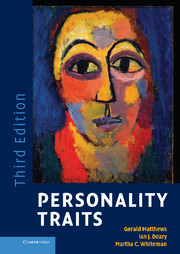Book contents
- Frontmatter
- Contents
- List of figures
- List of tables
- List of boxes
- Preface to the third edition
- Preface to the second edition
- Preface to the first edition
- Part I The nature of personality traits
- Part II Causes of personality traits
- 6 Genes, environments and personality traits
- 7 The psychobiology of traits
- 8 The social psychology of traits
- Part III Consequences and applications
- 14 Conclusions
- References
- Author index
- Subject index
- References
7 - The psychobiology of traits
Published online by Cambridge University Press: 05 June 2012
- Frontmatter
- Contents
- List of figures
- List of tables
- List of boxes
- Preface to the third edition
- Preface to the second edition
- Preface to the first edition
- Part I The nature of personality traits
- Part II Causes of personality traits
- 6 Genes, environments and personality traits
- 7 The psychobiology of traits
- 8 The social psychology of traits
- Part III Consequences and applications
- 14 Conclusions
- References
- Author index
- Subject index
- References
Summary
Introduction: neuropsychological approaches to personality
In this chapter we discuss the hypothesis that personality is an expression of individual differences in brain function. There are several reasons for linking personality traits to neural systems. First, there is the evidence from behaviour genetics discussed in the previous chapter. If personality traits are partially caused by genetic factors, then there must necessarily be a biological influence on traits, encoded within the person's DNA. Of course, the influence of the genotype on brain structure and function is likely to be influenced by interaction with the environment. Second, there is striking evidence for radical personality change resulting from brain damage (see Powell, 1981, and Zuckerman, 1999, 2005, for reviews). Damage to the frontal lobes of the cerebral cortex is notorious for disruption of personality; the person may become unstable, impulsive and even aggressive (depending on the exact region damaged). Third, there is some, though not unequivocal, evidence that traits correlate with biological indicators of brain functioning, such as the responses gathered from functional magnetic resonance imaging and electroencephalographic studies. Correlations between brain and trait parameters suggest that we might develop psychobiological theories of personality traits. Such theories should describe how individual differences in the functioning of specific brain systems influence long-standing individual differences in behaviour.
However, there are various difficulties involved in building a psychobiological theory of personality traits. First, the complexity of the task is daunting.
- Type
- Chapter
- Information
- Personality Traits , pp. 187 - 230Publisher: Cambridge University PressPrint publication year: 2009



